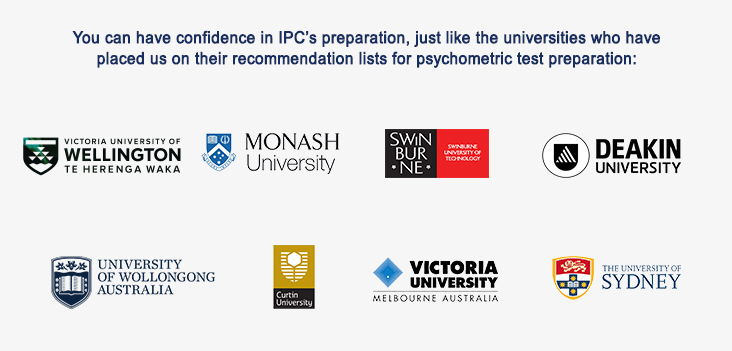Preparing for the Department of Fire and Emergency Services WA (DFES) Cognitive, Emotional Intelligence and Personality tests 2025
If you are applying to join Department of Fire and Emergency Services (DFES) , you will be asked to complete a variety of cognitive and personality assessments as part of your entrance exam.
In the screening phase, you will be asked to complete a combination of cognitive and behavioural assessments which measure the following:
- Numerical reasoning
- Verbal Reasoning
- Error checking
- Mechanical reasoning
- Diagrammatic and abstract reasoning
- Behavioural assessments
- Emotional Intelligence (Emotify)
1. DFES' Cognitive Assessment
Department of Fire and Emergency Services (DFES) is using a Cognify test as well as a set of cognitive assessments to assess candidates' cognitive abilities.
1.1 What is DFES' game-based cognitive assessmnts?
DFES uses the Cognify test which is a game based type of psychometric testing. Each test is timed and looks like a basic video game.
The Cognify test moves away from the question/answer based style of standard psychometric tests. Instead, it uses game based tests to measure your abstract, verbal and numerical reasoning. This means that you no longer have a series of questions on the screen andno calculator or paper pad is necessary.
You are expected to follow the instructions carefully as you start each test or game.
The theory behind DFES' game-based cognitive mini tests
DFES' Cognitive test model is based on the Cattell-Horn-Carroll theory of the structure of human cognitive abilities.
The theory combines concepts like fluid and crystallised intelligence and the three-stratum model of intelligence. It has aided the evolution of the psychometric approach in understanding human cognitive characteristics by employing advanced statistical techniques like factor analysis.
What to expect in DFES' Cognitive game based tests
DFES' Cognify tests measure three components about your cognitive abilities:
- 1. Problem Solving:
In problem solving the test assesses your ability to quickly learn, adapt and solve problems.
This measures your ‘fluid intelligence:’ the ability to see a problem for the first time and find out how to solve it without any prior knowledge.
- 2. Numerical Reasoning:
In numerical reasoning the test assesses your ability to understand numerical concepts, work with numbers and use formulas to solve problems.
- 3. Verbal Knowledge
In verbal knowledge the test measures your knowledge of the English language – focusing on spelling, grammar and identification of errors in text.
Timer
Each of the tests in the Cognify set of games is timed at 5 minutes.
What to expect in problem solving game-based tests:
The Cognify Test has three mini tests measuring your problem solving skills:
- Gridlock
- Resemble
- Short Cuts
The ‘Gridlock’ test
In this mini test you need to solve a number of consecutive grid based puzzle games as quickly as you can.
There is generally a central grid and you have to fit the given figures in (rotate, drag and drop) to complete the grid.
The ‘Resemble’ test
In this mini test you will be presented with a figure in the left section and generally a simple ‘angle of rotation’ value given beneath it, for example: 180o or 90o.
All you have to do is mentally rotate the figure on the left by the angle indicated and recreate the resultant figure in a central grid on the right.
The ‘Short Cuts’ test
In this mini test you are asked to move a particular ball and move it to a destination indicated by stars. You are supposed to move the target ball to the destination using the fewest moves as quickly as possible.
What to expect in the numerical ability game-based tests:
The Cognify Test has two mini tests measuring your numerical ability:
- Numbubbles
- Tally Up
What to expect in the ‘Numbubbles’ test
This mini test displays a target number and a number of bubbles with simple equations.
Your task is to identify the bubbles containing an answer equal to the target value displayed.
What to expect in the ‘Tally Up’ test
This mini test displays two sections with numbers (appearing as tokens) in each frame. Your task is to decide which frame has a higher value of numbers (tokens) or both frames might be of equal value.
What to expect in verbal knowledge game-based tests:
In the Cognify Test you will have two mini tests measuring your verbal knowledge:
- Proof It
- Pop Up
What to expect in Proof It test
In this mini test you are presented with series of texts that include grammatical errors such as punctuation errors, missing words, misspelled words and grammatical errors.
Your task is to identify all grammatical errors in each text in 1 minute.
1.2 What is DFES' cognitive assessment (not game-based testing)
DFES also uses a set of cognitive assessments, which are not game-based, to assess applicants.This test is very different from the game-based cognitive tests both is length and in nature.
DFES' verbal reasoning assessment (non-game based):
In this assessment, DFES uses a set of verbal test questions that include several test question types: deductive reasoning, word associations, odd one out and logical thinking.
Let's check the following verbal test question examples:
The following example verbal test question measures your logical thinking:
Which two statements together prove that Tim has a red car?
A. Gil likes Tim's car colour
B. Tim likes fast cars
C. Gil has a fast car
D. Gil likes only red cars
E. Tim's car is not silver
The next example verbal reasoning test question uses word associations or word knowledge to measure your verbal reasoning:
Which are the two odd-ones out?
A. Borrow
B. Trade
C. Sell
D. Rent
E. Loan
F. Lease
DFES' numerical reasoning test questions (non game based)
DFES uses several types of numerical test questions to measure your numerical abilities. These include several question types: traditional number series, graphs and tables, basic arithmetic, formula based numerical questions and basic quantitative questions.
Let's check the following numerical test questions examples:
Example numerical test question 1:
Tom has been flying his small jet for 30 minutes and has travelled 200 Kilometres. What has been his average speed in Kilometres per hour?
To answer this question, we need to first change the time Tom has been flying from minutes to hours. As there are 60 minutes in an hour, 30 minutes equals 0.5 hours. Then, we need to divide the distance by time to find the speed in which Tom was flying. 200km/0.5 hours = 400 km per hour.
Example numerical test question 2:
Each dough machine at Paula’s Bakehouse can make 2 large dough batches in an hour. She has 3 of these machines. How many batches of dough can Paula make in 6 hours?
To solve this question, we need to calculate how much can each machine make in one hour and multiply this by 3 machines and by 6 hours. If one machine can make 2 batches in one hour then, 3 machines can make 3 x 2 batches = 6 batches per hour. Then, in 6 hours the 3 machines can make 6 x 6 batches per hour = 36 batches in 6 hours.
Example numerical test question 3:
44 out of 400 is what percent?
To solve this question, we need to understand percentage. A percentage means how many times can a section fit into a whole. If the whole is 400 and the section is 44 then, (44/400) x 100 will be 44 out of 400 in percentage.
Example numerical test question 4:
Wat is the smallest value out of the following numbers?
0.0012
0.0015
0.0101
0.0122
To answer this question, we need to evaluate all the numbers. The first rule is that if the number has a decimal point then as the number has more zeros on the right side of the decimal point the value of this number is smaller. Therefore, we can see that 0.0012 and 0.0015 are smaller than 0.0101 and 0.0122 simply due to the number of zeros to the right of the decimal point. Then, as 12 is smaller than 15, 0.0012 is smaller than 0.0015.
Example numerical test question 5:
What is the next number is this series: 1, 4, 9, 16, 25, ?
To answer this question, we need to find a pattern that fits the sequence of numbers. In this case the pattern is +3, +5, +7, +9,,,. Therefore, the next number will be 25 + 11 = 36.
Diagrammatic or abstract test questions (non game based)
DFES uses diagrammatic reasoning test questions to measure your problem-solving skills, your ability to make decisions with partial information and your strategic thinking. The diagrammatic reasoning test includes a series of test questions that you need to complete under time constraints. This style of test questions was designed to measure you ability to understand logical processes. Each question has a set of input and output figures and a number of operators/effects. The operations/effects' function is described in text and in illustrations. In each question there is one element missing - either the input figures or output figures or the operations.
Let's review the following diagrammatic question example:

The question is:

This question requires you to identify the correct sequence of ‘input’ shapes based on the provided sequence of ‘output’ shapes. For this style of question, you are not provided the input sequence, rather, only the output sequence and an “Effect Operator”. These operators modify the input shapes in different ways to transform them into the output result. To solve this task, you must work backwards starting with the output sequence with reference to the operator and applying the effect in reverse to identify the correct input sequence.
In this question there is only one operator or effect. Based on the illustrated instruction panel, effect * changes the shapes and sizes of all white figures (from squares to circles or from circles to squares and from big to small or small to big). To reverse this effect, we need to change back all the white figures’ shapes and sizes. This means changing the first small, white square into a big, white circle and changing the second figure, which is a big, white circle into a small, white square. The sequence of figures after reversing this effect is: a big, white circle, followed by a small, white square and a small, black circle.
DFES' Error Checking test questions
This set of test questions has been designed to measure your ability to pay attention to details. Each test question will introduce 2 similar lists of information. The two lists of written items will be similar but not identical. They will have small differences in letters or signs. You will be asked to identify how many items on both lists are identical.
Let's review the following test question example:
How many items on both lists are identical?
McDowell Corp. McDowel Corp.
Finickers Fish ‘n’ Chips Finichers Fish ‘n’ Chips
Eastern Star Co-Op Eastern Star Co-Op
Carthagie Cricket Team Carthagie Cricket Team
Minnie’s Ice Creamry Minnies Ice Creamery
To answer ths question, you need to compare the details f the two lists. The first pair of items has a mistake. There are two l’s in the first ‘McDowell’ and only one in the second. The second pair has ‘Finickers’ in the first column with a ‘ck’ and in the second with a ‘ch’. The third and fourth entries are identical but the last entry has ‘Creamry’ vs ‘Creamery’, there’s an ‘e’ missing. The correct answer is 2.
3. DFES' - Emotional Intelligence test questions
The emotional intelligence test was developed as a reasoning measurement of people’s emotional intelligence using 3 distinctive aspects of your emotional intelligence.
- Ability to identify emotions in facial expressions.
- Ability to identify people's emotions based on their behaviour.
- Ability to manage emotions.
DFES' emotional intelligence test includes 3 parts:
Part 1 measures your ability to identify emotions on people's faces. This section is timed. You have 3 seconds to identify an emotion on someone's face and match it against a written emotion.
Part 2 measures your ability to identify people's emotions based on a scenario or situation. This section is timed. You have 1 minute for each test screen.
Part 3 measures your ability to manage emotions. This section is not timed. You will need to select an action to an emotionally based scenarios.
The challenge with DFES' emotional intelligence test:
Contrary to most Emotional Intelligence tests used in the market, DFES' test is a reasoning rather than a personality based test. This means that the DFES' emotional intelligence test regards EI as a cognitive ability and therefore uses a timer as part of the test.
What is a DFES Emotional Intelligence test question?
The DFES test has two types of test questions:
The first type or test question style includes a short scenario that describes a situation about one or two people. Then you are asked to decide what is each person in the scenario likely to feel. Your answer will not only include the emotion but also the facial expression that conveys the correct emotion.
The second type or test question style includes a screenshot of a face and you are asked to decide whether this facial expression conveys a specific emotion. Your answer can only be yes or no.
Let's review the following example test question for the DFES emotional intelligence test:

Is this Surprise?
Here you need to analyse the facial expression to identify the correct emotion.
Criteria has designed several Personality Tests which are used by employers to assess job candidates’ behavioural style. The most popular tests are:
3. Department of Fire and Emergency Services (DFES) - Behavioural assessment or Personality test
DFES uses several behavioural or personality tests to measure your personality profile. Some are clinical personality assessments and some are work-related personality tests.
All DFES' personality and behavioural assessments are untimed.
Let's check the following DFES' personality assessment question example:
I prefer playing tennis than basketball?
A. Strongly disagree
B. Disagree
C. Neutral
D. Agree
H. Strongly agree
This personality assessment question measures in a covert manner your social skills and your ability to work well in a team.
In your DFES practice personality test you will receive detailed answer explanations to allow you to understand what each question measures and how to answer so you can emphasize your strengths.
How IPC helps you to prepare for the Department of Fire and Emergency Services (DFES) cognitive, emotional and behavioural assessments
The Institute of Psychometric Coaching (IPC) has developed a variety of tailored preparations to ensure you are ready for your cognitive test. Our professionals have analysed strategies and techniques and developed a full range of countermeasures. Our preparations include:
1. Online specific DFES cognitive, emotional and behavioural assessments prep packages:
- A large pool of online practice cognitive tests – tailor for DFES' cognitive assessments.
- Practice material for the emotional intelligence test.
- A large pool of clinical and work-related behavioural assessments tailored to DFES
- Step by step solutions at the end of each assessment
- Test scores in comparison to others
- Feedback on how to improve
Benefits include:
- Based on real DFES cognitive, emotional and personality assessment questions
- Timer mimics the pressure of taking the real test
- Immediate access
2. Face-to-face tutoring for DFES' cognitive tests, emotional test and behavioural assessments as well as for the interview.
Experience gold standard service with IPC’s personal tutoring.
Our personalised service includes:
- One-on-one personal tutoring delivered by experienced Psychometricians.
- Face to face sessions (in our Melbourne and Sydney offices) or via Teams live
- In depth analysis of your cognitive weaknesses to focus the session and maximise your scores
- Working together to ensure you reach maximum potential and capabilities in your DFES' Cognitive, Emotional and Personality assessments







